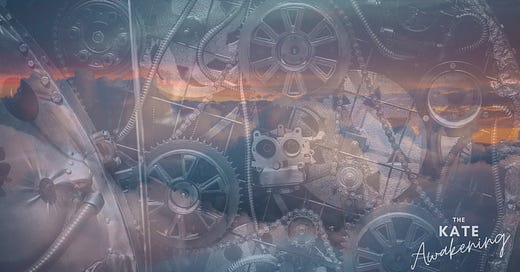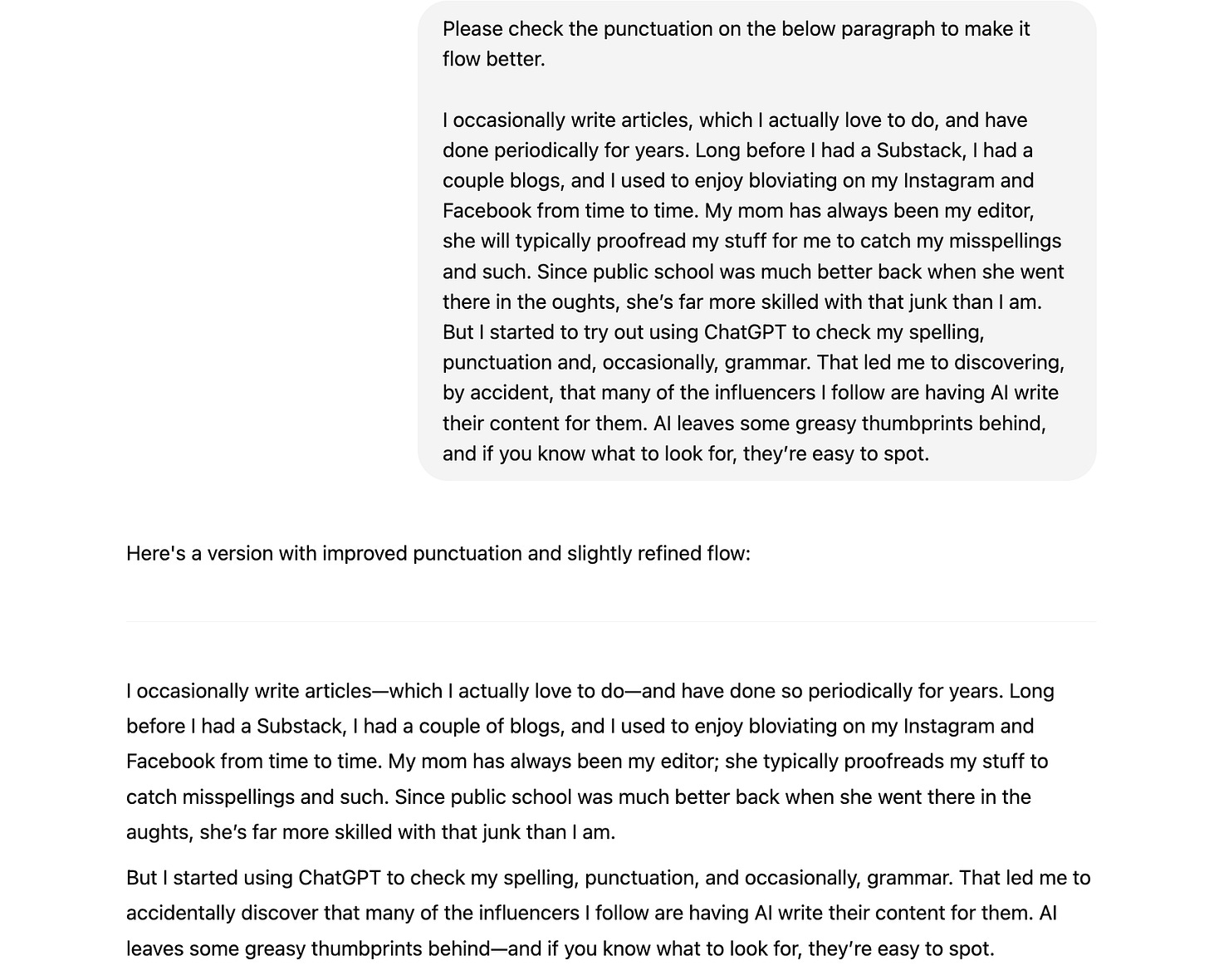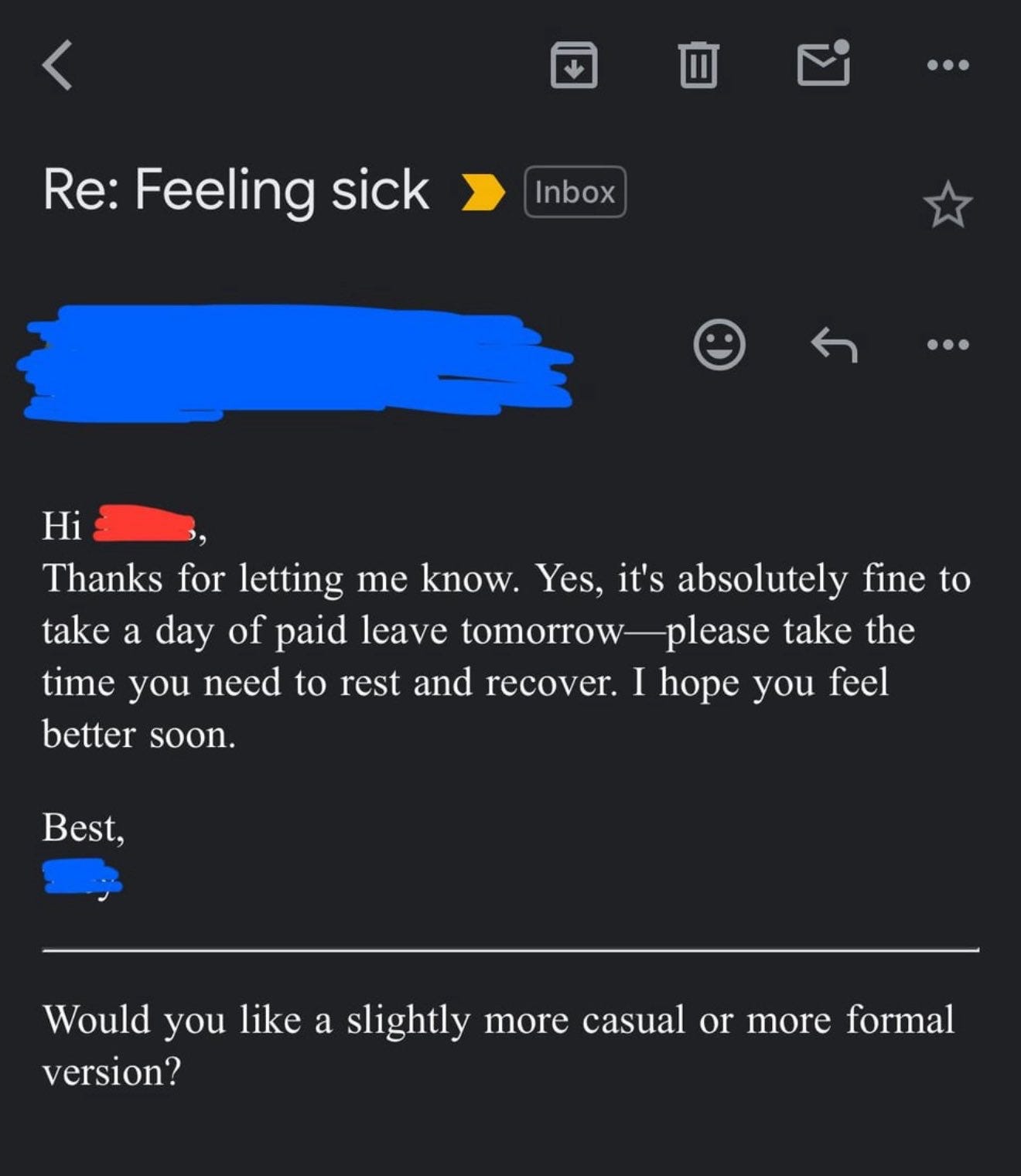If growing up in the 80s taught me anything, it’s that robots would eventually take over the world. Movies like RoboCop, The Terminator, Blade Runner, even Short Circuit, laser lips, all gave us a glimpse into the inevitable future where machines would stop being helpful and start plotting their revenge.
In the 90s and early 2000s SciFi began to shift from rudimentary robot vengeance “MUST… KILL… bee-bop-boo-beep” into something far more nuanced and unsettling, the sentience of artificial intelligence - where machines don’t just seek to destroy us, they want to understand us, replace us, or, worse, be loved by us. (barfs) I remember being skeeved out for weeks, maybe months, after watching the movie Her. If you haven’t seen it, Joaquin Phoenix falls in love with an intelligent operating system with a warm, velvety voice (Scarlett Johansson). She goes from being a helpful assistant and offering companionship to developing a unique personality with curiosity, humor, jealousy and existential longing. The movie blurred the lines between consciousness and programming, and made the audience contemplate whether love and human connection really requires a soul, or if it could be replicated by technology.
It was meant to be dark, scandalous and provocative, almost like a Black Mirror episode, but I think most came out of the movie feeling like, AI is cool and all, but surely we’d never let it get THAT far.
Right?
Other movies like A.I. Artificial Intelligence, I, Robot, and Bicentennial Man each warned that computers might someday out‑think, out‑feel, or out‑law us. In the future, machine intelligence may take over and become our overlord. But The Matrix took it even further… asking whether we’d even notice if it already had. Far more dangerous than nut and bolt robots marching down the streets was the idea of an invisible system, wired into our brains, quietly writing our perceptions, beliefs, choices, and identities.
It was something that seemed 100 years away in a dystopian future. But, looking at the world today with the rise of algorithmic control, influencer culture, and AI-generated content, I have to wonder: are we already plugged in?
We thought we were breaking free when we turned off the mainstream media. We patted ourselves on the back for seeing through the scripted news and corporate talking points. But in many cases, we simply traded one illusion for another. Now, instead of network anchors, we follow influencers, independent journalists, and online personalities, convinced we’ve found “real truth seekers.” But just like legacy media, we rarely know who or what’s funding them, shaping their message, or even writing their content. Some are bought and paid for, I believe some of that is beginning to be exposed. Others are unwitting puppets of ideology or echo chambers. And increasingly, even the most sincere voices are outsourcing their words to AI - publishing tweets and articles, even writing talking points or entire scripts for shows and interviews.
It’s not that these people are necessarily being intentionally duplicitous. But once you become an “influencer” or a content creator with a large following, especially if it’s your livelihood, now the pressure’s on to consistently crap out content. And even the most brilliant of minds still have a weekly limit to their inspiration and cleverness. So what happens when the well of genius runeth dry, but the algorithm still demands it’s daily sacrifice?
Some have resorted to outright plagiarism, copying content from others verbatim. But these days you almost always get busted for that, and it really makes you look lame. So the savvier ones at least pretending to have some integrity have found a more subtle workaround by turning to Grok and ChatGPT. These platforms can read and summarize entire articles, generate commentary, or take someone else’s original thought or point and reword it to sound like it was the user’s own.
Ever notice how you’ll see the same joke or observation on Twitter pop up in half a dozen different voices, each slightly reworded? That’s not a coincidence or the collective consciousness at work. It’s content constipation on full display.
So why should we care? Certainly a genuine person isn’t going to broadcast anything created by AI that they don’t already agree with. It’s not like they’re having these tools completely do their thinking for them, right? I mean… Right? 😬 The problem is that the more we blur the line between human thought and AI-generated messaging, the easier it becomes to manipulate perception. AI isn’t some divine, all-knowing intelligence, it’s a reflection of the human beings who programmed it, complete with their biases, blind spots, and agendas. It’s been trained not just to generate information, but to guide it, nudging thought, framing narratives, and reinforcing the perspectives it was programmed to favor. We’re blissfully unaware what ideas or ways of thinking are being subtly engineered into our worldview.
It’s also far from infallible. I’ve caught AI more than once distorting facts or bending the truth to deliver the answer that it thought I wanted. Which was eye-opening to me considering that’s the exact opposite of what it was designed to do. The truth is, you can very easily manipulate AI to generate the answer you want it to give you, and you might even do it unintentionally just by the way you phrase your questions or what it’s already learned about you through previous interactions.
By leaning on AI, we’re slipping further away from something we should be frantically digging our way back to - authenticity. There’s something inherently alive in human expression, even in written form. There’s subtle energy encoded in every choice of word, the structure and cadence, and every imperfection. As human beings, we embed a piece of our soul in everything we create, and that’s something that no machine can synthetically mimic.
It’s SO EASY and appealing to let AI do the work for us these days, it’s the warm bed with a down comforter beckoning to us while we sit on a cold, hard chair with bare legs accomplishing our tasks. Giving in to that convenience thirst trap myself is actually how I stumbled onto the dirty little secret: a lot of people aren’t doing their own work anymore… AI is.
I like to write, but it takes me forever. To give you an idea how long things take me, I started writing this article at noon, and it is now 2:40. I took 2 short breaks for a phone call and a bath, and to briefly stare into the abyss as I got lost in my own thoughts a few times. I have all my notes below that I will eventually erase as I add the points I’m reminding myself to make. For the most part I just flow and pause to reflect, then I have to reread what I wrote from the start to remind myself wtf I’m talking about. Rinse. Repeat. Until I have something I feel like I can hit “publish” on. I have a pretty solid grasp of the English language, but my spelling and punctuation suck, and I can’t create a proper outline to save my effin life.
I started using AI back in The Clean Living Project days when I was taking massive amounts of information from studies and articles and trying to condense them down into bullet points that would be easily digestible for people. AI was wonderful for that. At the time, it wasn’t a tool for collecting those article or studies and it couldn’t read them for me, or, if it could, I’m a moron and didn’t know how to use it. That would have been much easier. The collection and reading of the material took me days, but once I had that part done I could just kind of vomit all my notes into ChatGPT and ask it to structure them into an outline and break it into sections. It handled that task easily. Almost all I had left to do was make the graphics for my slides. I also always made a point to genuinely understand whatever it was I was presenting. That was very important to me. I didn’t want to be a glassy-eyed news anchor, I wanted to make sure I was really giving people information that would help them, and I knew there would always be questions or people wanting me to elaborate more. I didn’t want to let anyone down or get caught with my pants around my ankles because I was just reading off a proverbial teleprompter.
I occasionally write articles (very occasionally), which I actually love to do, and have done periodically for years. Long before I had a Substack, I had a couple blogs, and I used to enjoy bloviating on my Instagram and Facebook from time to time. My mom has always been my editor, she will typically proofread my stuff to catch my misspellings and such. Since public school was much better back when she went there in the aughts, she’s far more skilled with that junk than I am.
But I started to try out using ChatGPT to check my spelling, punctuation and, occasionally, grammar. That led me to discovering, by accident, that many of the influencers I follow are having AI write their content for them. You see, AI leaves some greasy thumbprints behind, and if you know what to look for, they’re easy to spot.
This first one I think is the most obvious and the most common, and I bet after I point it out to you, you’ll begin to spot it everywhere. First, let me show you what happens when I plug the paragraph above into ChatGPT and ask it to fix my punctuation and see if you notice anything. You don’t have to read it, just skim the answer it gave me with your eyes.
Do you see them?
If not, I’ll help you out.
Behold: the em dash (—).
The em dash is nothing unique to AI writing and it’s a useful punctuation mark to set off a thought, make clarification, add emphasis, etc. It became popular in American literature in the 18th and 19th centuries, and you’ll sometimes still see it in formal writing. But informal writing is a different story.
How often have you used an em dash in your life, say, when writing a casual text or email to a friend? Do you use them in tweets when you’re just spitballing or shooting the shit? I know I don’t. Yet I see them all the time now in the tweets and articles being posted by content creators.
Even in formal writing, the em dash is sprinkled in sparingly. But for whatever reason, ChatGPT has a real hard-on for these little dashes. Go try it out for yourself right now, ask it to write something for you and see if you spot them.
It made me wonder if there’s been an uptick in em dash usage on X/Twitter in the post-ChatGPT era. So I took the question to Grok, since I figured it would have better access to that info, and this is what it told me.
So apparently this is something that’s been widely noticed by many people. It’s even now been dubbed the “ChatGPT hyphen.”
So does this mean that everyone who uses an em dash is positively using AI to produce their work for them? No, it doesn’t. But I would be very interested to see who used it regularly in their writing style pre November 2022, and who has newly adopted this punctuation choice into their regular repertoire.
In fact, I might go one step further and wonder - who among the em dash enthusiasts would actually, gun to their head, know how to produce an em dash on the spot. 😂
It’s not a key on anyone’s keyboard, it’s slightly more involved, which is why, in informal writing, a comma just makes so much more sense.
While digging into this em dash phenomenon, I learned that some of these AI giveaways have become so recognizable that entire tools and AI-versions now exist to erase them. Ironically (and somewhat terrifyingly) called “AI Humanizers,” these plug-ins are designed to strip out the patterns or markers that expose AI-generated content.
From what I’ve seen, they still leave some traces and there are what I would call “tells” left behind.
These tools have started to outsmart the em dash and replace them with ellipses… especially in places where they don’t belong, for example at the end of a complete sentence. Maybe you’ve seen your favorite content creators do this…
In a curious twist, sometimes the em dash will still be used, but with a distinction. In American English, the em dash will typically be used—as you can see here—without spaces before or after, so that they are touching the words of the 2 parts of the sentence they’re connecting.
In British English, and some journalistic styles, the em dash will be used with a space before and after — like this — so the words are disconnected.
I have no idea why adding the spaces is considered more “humanized.” Perhaps the space throws off AI detectors? I’m really not sure.
There are other tells as well (bullet points with bolded terms, anyone?) But the point of this article is not to expose the people using AI. Besides, we know they’re already learning to adapt as more people catch on. Some who may have landed on this article might already be skimming through their own work right now, hunting down those pesky dashes.
The point of this article is more to open up the conversation about what we’re letting “influence” us and the importance of genuine human connection. I worry we’re in danger of losing the very qualities that make us human, but it won’t happen all at once. We’re slowly and subtly being simmered like frogs. The danger of convenience is “if you don’t use it, you lose it.” Just like muscles, our brains can atrophy from disuse. Much like the movie Wall-E that depicted the humans of the future with weak, disconnected bones due to centuries of physical inactivity and constant reliance on automated systems. If we stop challenging ourselves, thinking critically, creating from scratch, or engaging people with our own thoughts and feelings, we risk outsourcing not just our productivity, but our identity. Emotional depth and intuition are human faculties that need to be constantly nurtured, massaged and exercised or they begin to weaken. The more we hand over to algorithms in the name of ease, the more we risk becoming passive consumers of thought instead of active participants.
I’d like to revisit the example I gave earlier.
If you’ll notice, I had only asked it to check the punctuation, but it took it upon itself to also correct my spelling (ought/aught) and even subtly reword the sentence about my mom being my editor.
So what’s the big deal? It’s just tidying things up a bit and saving me from outing myself for being spelling-impaired. But that’s exactly what got me thinking more deeply about this in the first place. When I eventually started using ChatGPT to correct my spelling and punctuation, I noticed it would quietly tweak my grammar, as well. I’d read the changes and think “yeah, that actually sounds better. It still feels like me, but more polished.”
But did it?
Back in the early 2000s, I used to write emails to my friend Carolee from time to time, just checking in with her, sharing whatever was going on in my life, whatever. One day when I went to visit her, she started telling a guy we were hanging out with about my emails. She laughed and said “I live for Kate’s emails. She cracks me up because I can totally hear her voice when I read them.” And I remember thinking that was an interesting thing to say - because who-the-hell’s voice was she supposed to hear them in? She explained that my writing had a sound that was unmistakably mine, which I wasn’t sure was a compliment or just a polite way of saying I write like a troglodyte. Like a kindergarten teacher encouraging her student with a “now, that was an interesting choice!” when she glues the popsicle sticks to her forehead instead of the soup can. I had always assumed good writing meant following rules and sounding polished, not letting your personality leak all over the page. But what she taught me was that a kind of human signature has a way of shining through, even when we’re not trying. Perhaps especially when we’re not trying.
Carolee is an interesting character in the story of my life because she left such an impact on me. She was always so encouraging and told me all the time that she thought I was “magic” and she wished I could see it. There were a few times she completely changed the trajectory of my life with her influence, and I can honestly say my life would be completely different right now if it were not for her. I would almost describe her as my muse if it didn’t make us sound like lesbians. But she was the one who really encouraged me to write when I was pretty sure I was piss poor at it. She also opened my eyes to the fact that some of the things we find ordinary, clunky or grossly “human” about ourselves, can be seen as “magic” to others. And yes, of course that’s subjective. I’m sure plenty of people would call me a crumby writer, and I’d mostly have to agree with them. But I’d also be willing to bet that AI, no matter how advanced it gets, will never be magic to anyone. It will never replicate that raw, unmistakable human essence that ignites the pilot light in someone else. We call it chemistry, and that’s really what it is. Human beings are electrical, and our interactions carry profound exchanges of energy.
I started to picture a future where humans ride around in their motorized scooters being entertained by their devices while AI does all the thinking and communicating for them. A long time ago I jokingly tweeted that long after humans were dead and gone, Twitter bots would still be going back and forth messaging “Hey, baby. I like your profile.” to each other for eternity, and the thought still sends a shiver down my spine. It made me consider more deeply the importance of human interaction and how, just like food, the more processed it becomes, the less it nourishes us.
I ended up going back to the couple things I let AI “polish” for me and reverting them to my original drafts, warts and all. I may have run on sentences, too many commas, repeat myself, use the wrong version of a word (break/brake?), and make spelling errors that even my 9 year old would roll his eyes at, but at least I know it’s all me that’s seeping through to the reader. I don’t care about being a professional writer, I want my words to connect with people and speak to that part of their human nature that can read energy signatures.
It's scientifically proven that our bodies and minds respond to subtle frequencies, including the distinct energetic differences between what’s natural and what’s synthetic or inorganic. There’s a reason the seemingly imperceivable “static” from devices low key grate on our souls, as do the artificial, man-made materials around us, and we feel remarkably better when we get out in nature. The world is starting to feel colder and more hollow because we’ve been trading what’s raw, imperfect, and beautifully genuine for what’s convenient, perfected, and artificially seamless. We need to start placing more value on the things about us that make us human that can’t be replaced or mimicked; our emotion, empathy, intuition, humor, our stupid stories, and the warmth, heartbreak or silliness behind our words. We need to decide whether scrubbing the over-share from our emails is worth living in a world that feels soulless and sterile.
But choose carefully. Or the future we’ve been warned about for decades might just become reality.
And the robots will win.













Wow Kate...this cut right to my heart!!!! You have touched on something that is extremely important and something we never want to lose, being human! God made us unique and individually creative with gifts that complement others. We need each other just as imperfect as we are in order to stay being human, if that makes sense, hope so. So, thank you sweet girl for reminding us, reminding me that it's okay to be me.
Loved it Kate!! Just heartfelt and accurate. I refuse to work with ai. The autocorrect is enough for me and even that I sometimes ignore just to continue to spell out the entire words and not lose the ability or give in to convenience.